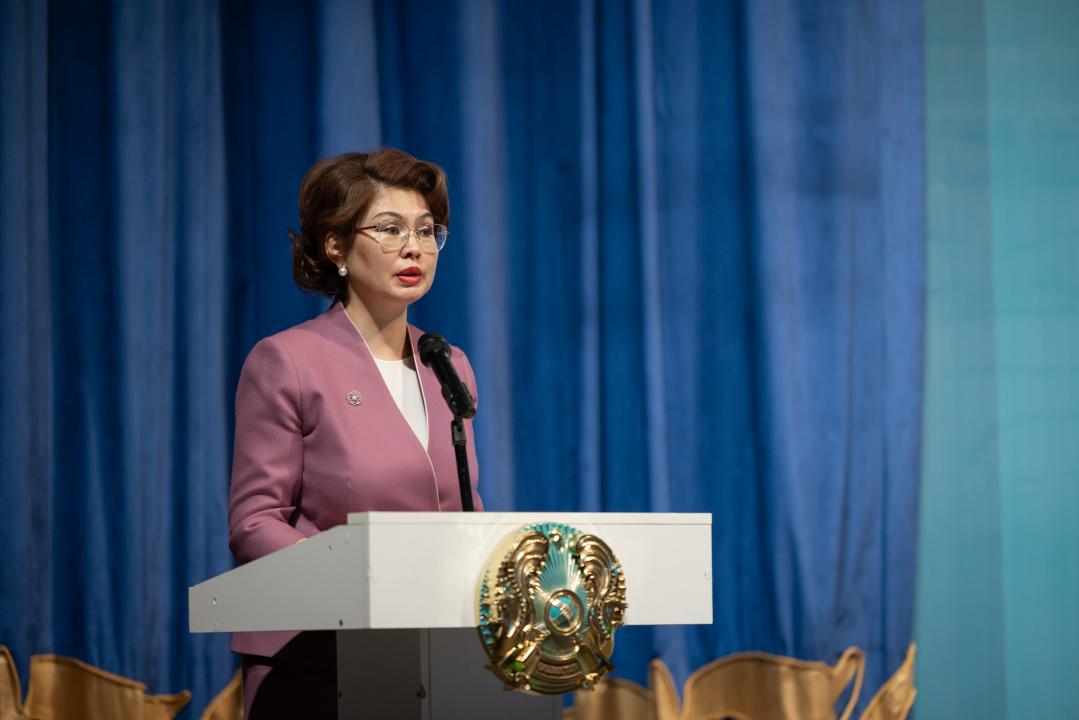ASTANA – Kazakh Minister of Culture and Information Aida Balayeva announced the ministry’s plans to promote traditional heritage and national identity for 2024, during the extended meeting on Feb. 15 in Astana, reported the ministry’s press service.

Kazakh Minister of Culture and Information Aida Balayeva. Photo credit: gov.kz.
The authority’s main roles will include developing strategies to preserve Kazakh heritage and traditions, from creating a website that promotes culture to the protection and return of important artefacts and rare documents.
The first thing to keep in mind is that culture is an important tool in presenting one’s identity both at national and international levels.
“Establishing the ministry, the head of the state set ambitious tasks. These include ensuring harmonious development of the state and society, maximizing internal ideological and external image potential and citizens’ confidence in the future of the nation by forming a competitive national identity, while preserving a unique culture in the global context,” said Balayeva.
Inclusion in the UNESCO list
Providing all necessary support and research for the inclusion of Kazakhstan’s several historical sites in the United Nations Educational, Scientific and Cultural Organization’s (UNESCO) World Heritage List is among the ministry’s top priority ambitious goals.
“As you know, the efforts are still on to include a number of historical and cultural sites of Kazakhstan in the UNESCO World Heritage List. The relevant documentation of historical sites such as Otyrar, Syganak, Kultobe-Yassy, Zhankent, Sauran, and Zhety Asar have been developed for this purpose,” said Balayeva, reported the Kazinform news agency.
The ministry’s initiatives should be endorsed by the local government authorities to agree on a framework that can be put into action, said Balayeva.
“Of course, here we need the help of local authorities, particularly with regard to enhancing the territories of the museum-reserves and historical and cultural sites, repair and construction of roads, installation of signposts, Internet systems, modular toilets and so on – in general, the active development or improvement of the infrastructure. We have sent letters about this to all akims (mayors) of the regions,” said Balayeva.
The return of Kazakhstan’s historical heritage
There has been a greater emphasis in recent years towards returning historical artifacts from the largest archives and libraries around the world. This year, the ministry will continue this work with countries such as China, Russia, Uzbekistan and a number of European countries.
The minister also underscored the significance of renovating and enhancing the state of the nation’s cultural facilities to meet acceptable standards.
“As of today, the modernization of the country’s three museums is planned to meet contemporary standards along with their internal expositions. Besides, a large-scale restoration center will be opened at the National Museum, where conditions will be created to preserve the values reflecting the centuries-old history of our people,” said Balayeva.
“Restoration, protection and propaganda of historical heritage is one of the most important issues facing the ministry. At the same time, special attention is paid to the enrichment of their inner content,” she added.
Culture website
The ministry will also launch a website named Culture that will document Kazakhstan’s cultural and historical heritage in museums to promote it across time and place.
“For the first time, we are launching the Culture online website in seven languages. Through the website, we intend to promote our cultural values not only among Kazakhs, but also among foreign guests. Such projects have long shown their effectiveness in world practice,” said Balayeva.
“Its main task is to create conditions for every person interested in our cultural heritage to get acquainted with museums, libraries, theaters, national cinema, exhibitions, museum-reserves, the golden fund of national music and new samples of modern music without leaving home,” she added.
Other plans and events for 2024 include book publishing support, the establishment of a literature club, the introduction of the Kazakh National Electronic Library, and contests for film production in a new format, among many others.
